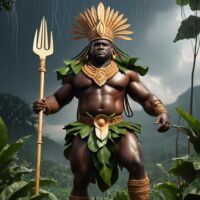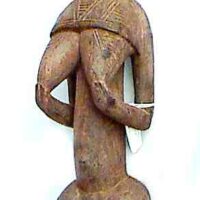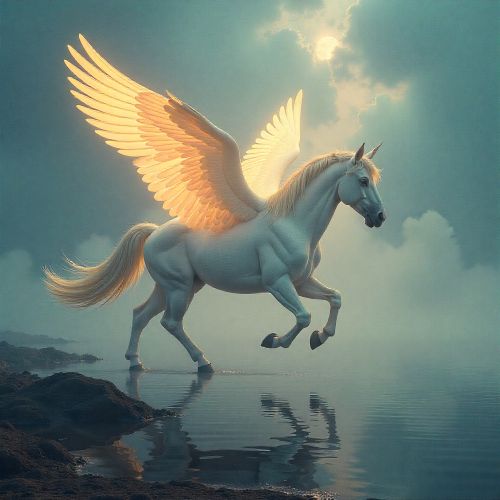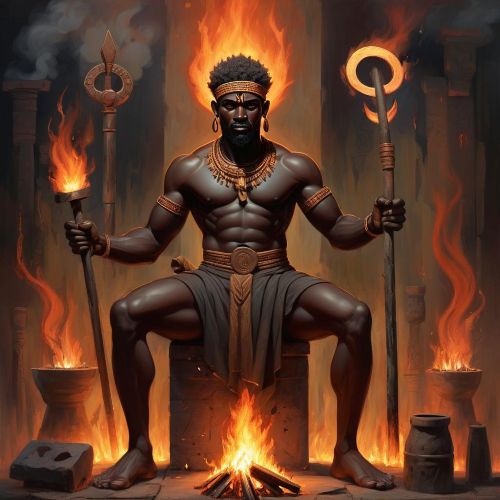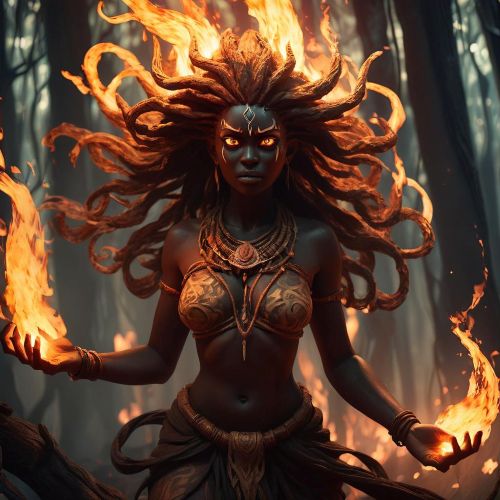Bemba : The Supreme God
Listen
At a glance
| Description | |
|---|---|
| Origin | Bambara Mythology |
| Classification | Gods |
| Family Members | N/A |
| Region | Mali |
| Associated With | Creation, Supreme Powers |
Bemba
Introduction
Bemba is a central deity in Bambara mythology, playing a pivotal role in the spiritual life of the Bambara people of Mali. As a member of the broader Mande ethnic group, the Bambara’s mythology features a diverse pantheon that reflects various elements of nature and human experience. Bemba is especially significant, embodying the supreme creator and architect of the universe in this mythological framework.
Though not directly worshipped, Bemba’s influence is subtly integrated into daily rituals and prayers. Known also as Ngala, Bemba is represented as a quaternity—an entity formed by the union of four distinct beings: Pemba, Nyale, Faro, and Ndomadyiri. Bemba’s nature is hermaphroditic, with male aspects represented by Pemba and Ndomadyiri, and female aspects by Nyale and Faro. This multifaceted representation highlights Bemba’s encompassing presence in the Bambara’s cosmological beliefs and cultural practices.
Physical Traits
In Bambara mythology, Bemba represents a divine force associated with fertility, agriculture, and the natural cycles of the earth. His physical depictions emphasize a robust and majestic presence, often featuring regal elements such as flowing beards or elaborate headdresses made from natural materials like leaves or animal horns. This imagery reflects his deep connection to the environment and his role as a mediator between the earthly and divine realms. Bemba’s form is fluid, symbolizing the ever-changing forces of nature he governs, and he is visualized in various abstract ways, such as radiant light, expansive sky, or formless energy.
Despite his central role in Bambara cosmology, Bemba is not directly worshipped. After creating the universe, he withdrew to the heavens, remaining omnipresent but removed from the physical world. Bemba’s essence is divided among four entities: Pemba, the god of skies and air; Nyale, the goddess of fire and chaos; Faro, associated with water; and Ndomadyiri, who plays a mysterious role in the divine composition. Each entity contributes to the overall essence of Bemba, highlighting the deity’s complex and multifaceted nature.
Family
In Bambara mythology, Bemba, as the sole creator, transcends traditional familial structures. Instead of having a biological family, Bemba is linked to the creation of the first beings, who, while not his offspring, are considered spiritual progenitors within his cosmic family. This association establishes a divine lineage that underscores his significant role in the spiritual and cosmological order of the Bambara people.
Bemba is integral to a divine triad or broader pantheon, where he interacts with other deities representing various elements of nature and human experience. His connections to these deities—Mousso Koroni Koundyé (Nyale), Faro, and Ndomadyiri—highlight themes of harmony and balance, reflecting the interconnectedness of life and nature. These divine relationships play a crucial role in rituals and ceremonies, reinforcing cosmic order and ensuring the community’s prosperity through the interplay of elemental forces.
Other names
In Bambara mythology, Bemba is known by several names, including Ngala and Pemba, each reflecting different aspects of the deity’s nature. The name “Ngala” underscores the collective attributes of this supreme being, while “Pemba” specifically denotes one of its aspects. These variations illustrate the rich oral traditions and the multifaceted nature of Bemba, as different names highlight different facets of his divine role.
Additionally, Bemba may be called “Bembaya” or “Bembala” in various contexts, each name carrying unique connotations based on local traditions and practices. These names are more than mere synonyms; they embody specific meanings and attributes that emphasize different elements of Bemba’s character and influence. The range of names reflects the diverse perceptions and honorings of Bemba across different regions and communities within the Bambara culture.
Powers and Abilities
As the supreme creator, Bemba is credited with shaping the cosmos from a primordial void, establishing the earth, sky, and all living beings. His role extends beyond creation to include the ongoing sustenance and regulation of the universe. Bemba is associated with vital natural phenomena such as rain, sunlight, and fertility, which underscore his influence over essential aspects of life and agriculture in Bambara culture.
Bemba’s power is not exercised randomly; rather, it maintains a balance between order and chaos. This balance is exemplified in the concept of nyama, a force embodying disorder and unpredictability. While Bemba represents ultimate order, the interplay with nyama influences the world’s dynamics and human experiences. His divine authority encompasses the fertility of the land and control over natural forces like rain and growth, which are crucial for the Bambara’s agricultural prosperity. Rituals and ceremonies performed to seek his favor emphasize his role in ensuring the well-being of the community and protection from natural calamities.
Modern Day Influence
In contemporary Bambara life, Bemba’s influence extends beyond traditional religious practices into various modern realms. While traditional rituals and festivals honoring Bemba remain vital to cultural and spiritual practices, there is a notable integration of these traditions with modern elements. Cultural festivals often merge traditional rites with contemporary expressions of faith and identity, demonstrating how ancient beliefs adapt to the present day.
Bemba’s presence is also evident in art, literature, and popular culture, where his stories and attributes are portrayed through paintings, sculptures, and performances. These artistic representations preserve and celebrate Bambara heritage while introducing Bemba to wider audiences. Additionally, Bemba’s association with fertility and nature resonates with current environmental sustainability efforts. His teachings are being reinterpreted to address modern ecological concerns and promote a balanced relationship with the environment. Despite the introduction of new religious perspectives like Islam and Christianity, which have influenced contemporary beliefs, Bemba’s legacy endures. The concept of a supreme creator remains central to Bambara spirituality, illustrating a resilient syncretism that integrates traditional beliefs with new faiths.
Related Images
Frequently Asked Questions
What is lorem Ipsum?
I am text block. Click edit button to change this text. Lorem ipsum dolor sit amet, consectetur adipiscing elit. Ut elit tellus, luctus nec ullamcorper mattis, pulvinar dapibus leo.
What is lorem Ipsum?
I am text block. Click edit button to change this text. Lorem ipsum dolor sit amet, consectetur adipiscing elit. Ut elit tellus, luctus nec ullamcorper mattis, pulvinar dapibus leo.
What is lorem Ipsum?
I am text block. Click edit button to change this text. Lorem ipsum dolor sit amet, consectetur adipiscing elit. Ut elit tellus, luctus nec ullamcorper mattis, pulvinar dapibus leo.
What is lorem Ipsum?
I am text block. Click edit button to change this text. Lorem ipsum dolor sit amet, consectetur adipiscing elit. Ut elit tellus, luctus nec ullamcorper mattis, pulvinar dapibus leo.
What is lorem Ipsum?
I am text block. Click edit button to change this text. Lorem ipsum dolor sit amet, consectetur adipiscing elit. Ut elit tellus, luctus nec ullamcorper mattis, pulvinar dapibus leo.


